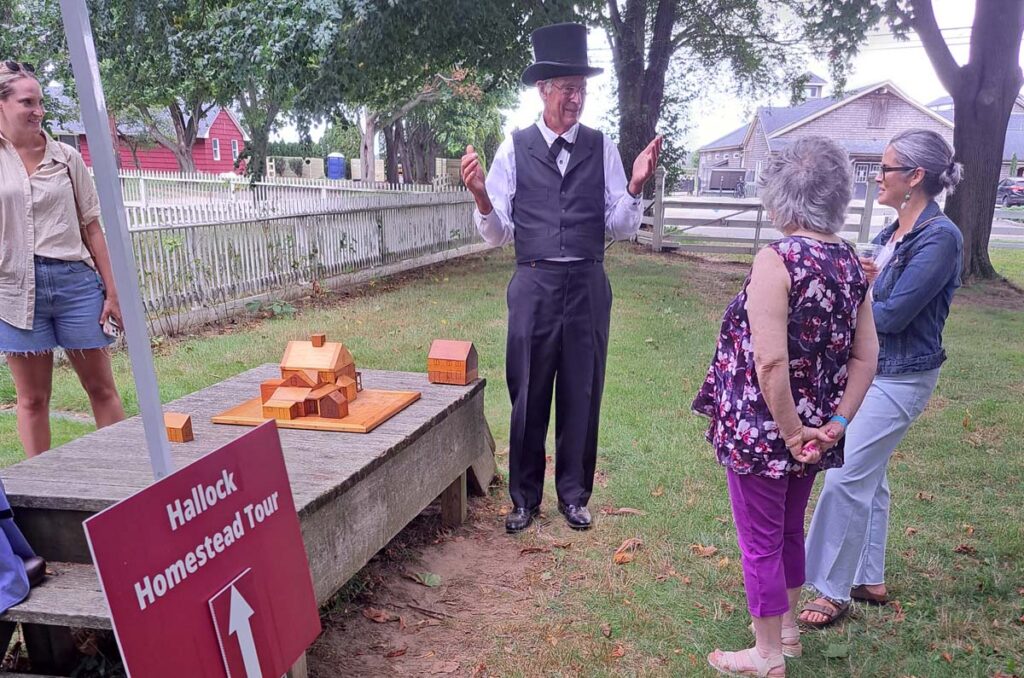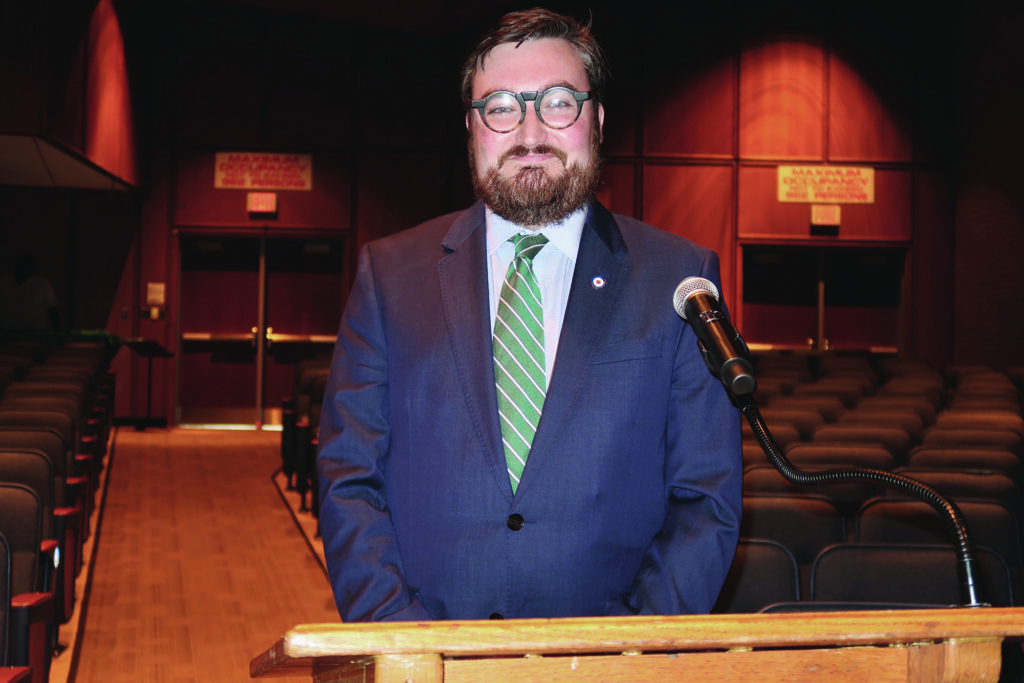County officials brief seniors on cybercrime, phone scams and how to guard against ID theft

Suffolk County law enforcement officials held a pair of a cybercrime prevention briefings for North Fork seniors on Wednesday to update the community on the latest and most prevalent scams being perpetrated against the elderly — online, in person and over the telephone. The officials said that so-called elder scams are on the rise and growing in sophistication and reach.
Financial exploitation accounts for up to half of all scams targeting the elderly in New York state, said Jennifer Milito, an assistant district attorney in the financial crimes bureau of Suffolk County District Attorney Ray Tierney’s office, at the briefing at the Riverhead Senior Center.
A second session was held Wednesday afternoon at the Southold Human Resources Center. County legislator Al Krupski, who introduced the law enforcement team, and Riverhead Supervisor Yvette Aguiar, were also on hand at the Riverhead briefing.
The officials offered some sobering statistics: citing a federal National Elder Abuse Incidence Study, they said that 92% of elder scam victims are women, and that only one of every 24 cases is reported to authorities, for a variety of reasons, including shame and embarrassment.
Officials said that senior citizens are targeted because most have a steady, predictable stream of income from either Social Security or a pension, and that often perpetrators will steal checks from the mail, or in some cases even dig up private financial information by going through people’s trash.
Suffolk County Police Detective Thomas Gabriele said that scams targeting the elderly are one of the fastest growing categories of crime over the past decade. He told the Riverhead seniors that above all else, they should protect their Social Security number.
“Social Security numbers are the be all and end all of identity theft.”
Assistant District Attorney Jessica Whitestone, who also serves in the financial crimes bureau, said that when mailing bills, any financially-related documents or anything that contains private information, seniors should exercise extra caution.
“If you have important information in your mail that has your personal information, go in to the post office instead of just dropping it in a mailbox,” she said. “If you’re disposing of something with your information on it, invest in an inexpensive shredder and shred it. There are people that go through garbage cans” looking for discarded personal information.”
The officials — who between them have decades of experience investigating and prosecuting financial crime on Long Island — provided handouts including the top ten ways to avoid fraud (see .pdf below).
The recommendations include: 1) Spotting imposters — beware of those claiming to be government officials or charities or representatives of major retailers; 2) Put any phone number provided by a stranger contacting you into a search engine — in quotes — to see if the number may be connected to scams; 3) “Never, ever, ever believe your caller ID,” Detective Gabriele said, describing how easy it is for criminals to “spoof” a number so it appears on caller ID to be coming from a legitimate company or agency; 4) Don’t pay upfront for a promise, whether it be debt relief, loan offers or home improvement work. 5) Don’t pay with a wire transfer, gift cards or cash —these are the three most common methods of transfer that scammers use get your money.
The officials suggested that a senior who is suspicious or in doubt should 6) Ask a trusted friend’s advice before turning over money or personal information over the phone, online or in person; 7) Hang up robocalls immediately; 8) Be skeptical of free or trial offers, and research cancellation policies, especially for subscription services — whether it be a magazine subscription or any online service with recurring charges; 9) Never deposit a check for a stranger and then wire the individual money or hand over cash. 10) Sign up for Federal Trade Commission scam alerts.
The officials also talked about how criminals will use stolen personal information to leverage victims’ assets, like using a person’s personal information to take out a second mortgage on a victim’s home without their knowledge, or even trying to sell a property out from under a victim, as was the case earlier this year on Shelter Island.
The law enforcement officials encouraged those in the audience to take advantage of a free alert program offered by the Suffolk County Clerk’s Office. The system will alert a resident to any new records filings related to their property or properties. To sign up for the alerts, call the clerk’s office at 631-852-2000, the officials said.
The Federal Trade Commission regularly updates its Consumer Alerts page, which notifies readers of the latest scams and how to avoid them. You can also file a complaint about a scam with the FTC via ftc.gov/complaint or by calling 877-FTC-HELP (382-4357).
Proactive internet security is another way to avoid being scammed, Detective Gabriele said. He cautioned seniors to never click on a link in an unsolicited email, which could allow the perpetrator remote access to a target’s computer and all their online files. This also applies to text messages, even if they appear to be coming from your bank or a company with which you regularly do business.
Keeping computer and cell phone software updated is also vital. The well-engaged crowd of Riverhead seniors laughed out loud when the detective told them what the two most common passwords are: “1234” and “password.” He said they are the first two that most criminals try.
“Use strong passwords!” Detective Gabriele urged. He also advised destroying or digitally wiping hard drives before discarding or giving away a computer. Finally, he said, be cautious about what you share on social media. Burglars nationwide scour popular social media like Facebook and Instagram, looking for families on vacation, for instance.
The county officials also distributed the Suffolk County Police Department Identity Theft Unit’s guide to protecting yourself against identity theft and fraud. The guide offers an extensive set of best practices for anyone who either fears they are or have been the victim of identity theft. The guide, which is embedded below and printable, includes instructions and sample letters that demonstrate how to put a security freeze on your credit, how to most effectively dispute fraudulent charges on your accounts and other valuable guidance on reporting and documenting financial fraud.
The officials said that seniors should continuously monitor and scrutinize billing statements and if they have concerns, check their credit bureau reports for any irregularities. They were also advised to be on the lookout for unexpected communications, like being contacted by a collections agency or receiving news that a loan they never sought has been denied.
One of the most vicious and pervasive telephone scams targets grandparents at their most vulnerable pressure point.
A caller will contact a senior citizen claiming to be a bail bondsman or a law enforcement official and claim the target’s grandchild has been arrested. The caller will insist that the grandparent send or surrender large sums of money immediately to get their relative out of custody. Urgency is a big red flag.
Detective Gabriele said the perpetrator will usually insist on cash, and cited two such cases that unfolded recently in Suffolk. In one instance, the victim gave $15,000 to a perpetrator who arrived at their home. The other victim met the perpetrator in a public place, and turned over $20,000 in cash.
The detective said that the bail scam and other telephone contact crimes are often perpetrated from outside the country by criminal organizations that are working with local thieves who meet the victim, pick up the cash and send it abroad to their bosses.
That makes it difficult if not impossible for local or even federal law enforcement to recover cash, wire transfers or transferrable funds like gift cards.

Prior to the presentation, as the seniors streamed into the Riverhead auditorium, a cheerful and energetic volunteer from the statewide Senior Medicare Patrol — which distributes literature, tips and best practices for older residents to protect themselves — kept reiterating a valuable series of warnings.
“Remember, folks, Medicaid never calls,” said SMP volunteer Ronnie Avnet Stoll. “Social Security never calls,” she said, urging those in attendance to hang up on anyone who claims to be calling from either of those federal agencies, or anyone seeking immediate payments in cash, via wire transfer or by any other method beside traceable transactions.
“These scammers just want your Medicaid number,” Ms. Avnet Stoll said. “They say they want to send you a brand new Medicaid card.”
She said that Medicaid and Social Security scams are a lucrative international criminal enterprise.
“On the dark web,” she told the seniors, stolen “Medicaid numbers cost more than Social Security cards.
“You’ve got to be on your toes.”
New York state residents can also call in reports and complaints to an elder abuse hotline at 844-697-3505.








